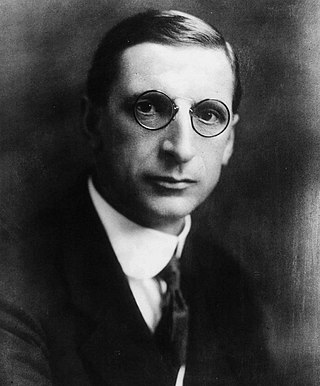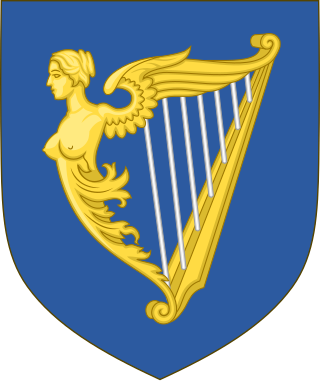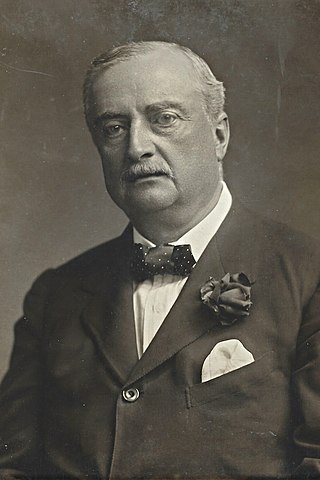Related Research Articles

The 1918 Irish general election was the part of the 1918 United Kingdom general election which took place in Ireland. It is a key moment in modern Irish history because it saw the overwhelming defeat of the moderate nationalist Irish Parliamentary Party (IPP), which had dominated the Irish political landscape since the 1880s, and a landslide victory for the radical Sinn Féin party. Sinn Féin had never previously stood in a general election, but had won six seats in by-elections in 1917–18. The party had vowed in its manifesto to establish an independent Irish Republic. In Ulster, however, the Unionist Party was the most successful party.

The Irish Parliamentary Party was formed in 1874 by Isaac Butt, the leader of the Nationalist Party, replacing the Home Rule League, as official parliamentary party for Irish nationalist Members of Parliament (MPs) elected to the House of Commons at Westminster within the United Kingdom of Great Britain and Ireland up until 1918. Its central objectives were legislative independence for Ireland and land reform. Its constitutional movement was instrumental in laying the groundwork for Irish self-government through three Irish Home Rule bills.

The 1918 United Kingdom general election was called immediately after the Armistice with Germany which ended the First World War, and was held on Saturday, 14 December 1918. The governing coalition, under Prime Minister David Lloyd George, sent letters of endorsement to candidates who supported the coalition government. These were nicknamed "Coalition Coupons", and led to the election being known as the "coupon election". The result was a massive landslide in favour of the coalition, comprising primarily of the Conservatives and Coalition Liberals, with massive losses for Liberals who were not endorsed. Nearly all the Liberal MPs without coupons were defeated, including party leader H. H. Asquith.
West Cork, a division of County Cork, was a parliamentary constituency in Ireland, represented in the Parliament of the United Kingdom. From 1885 to 1922 it returned one Member of Parliament (MP) to the House of Commons of the United Kingdom of Great Britain and Ireland.
South Dublin, a division of County Dublin, was a county constituency in Ireland from 1885 to 1922. It elected one Member of Parliament (MP) to the House of Commons of the Parliament of the United Kingdom, using the first past the post voting system.
Hugh Alexander Law was an Irish nationalist politician. He represented constituencies in County Donegal as a Member of Parliament (MP) in the British House of Commons and later as a Teachta Dála (TD) in Dáil Éireann.

Charles Edward Tisdall was the 19th mayor of Vancouver, British Columbia from 1922 to 1923. He was born in Birmingham, England and moved to Vancouver in April 1888. In 1899 he was elected Chairman of the Vancouver Board of Trade.
Islington West was a borough constituency in the Metropolitan Borough of Islington, in North London.

Elections were held in January and June 1920 for the various county and district councils of Ireland. The elections were organised by the Dublin Castle administration under the law of the then United Kingdom of Great Britain and Ireland (UK), and held while the Irish War of Independence was pitting UK forces against those of the Irish Republic proclaimed in 1919 by the First Dáil. Elections were held in two stages: borough and urban district councils in January; and county and rural district councils in June. Sinn Féin, which had established the First Dáil, won control of many of the councils, which subsequently broke contact with Dublin Castle's Local Government Board for Ireland and instead recognised the republican Department of Local Government. The election results provide historians with a barometer of public opinion in what would be the last elections administered on an all-island basis: the Government of Ireland Act 1920 passed at the end of the year effected the partition of Ireland from 1921, though the elections for the two home rule Parliaments envisaged by it were held on the same day; No further elections would be held simultaneously across the island of Ireland until 1979, when representatives of the Republic of Ireland and Northern Ireland to the European Parliament were elected. The next local elections were held in 1924 in Northern Ireland and in 1925 in the Irish Free State.
The Manchester South by-election was a Parliamentary by-election held on 5 March 1912. The constituency returned one Member of Parliament (MP) to the House of Commons of the United Kingdom, elected by the first past the post voting system.
The Midlothian by-election was a Parliamentary by-election held on 10 September 1912. The constituency returned one Member of Parliament (MP) to the House of Commons of the United Kingdom, elected by the first past the post voting system.
The Londonderry City by-election was a Parliamentary by-election held on 30 January 1913. The constituency returned one Member of Parliament (MP) to the House of Commons of the United Kingdom, elected by the first past the post voting system.
The 1916 Liverpool East Toxteth by-election was a parliamentary by-election held in England on 21 February 1916 for the House of Commons constituency of Liverpool East Toxteth.

The Irish component of the December 1910 United Kingdom general election took place between 3 and 19 December, concurrently with the polls in Great Britain. Though the national result was a deadlock between the Conservatives and the Liberals, the result in Ireland was, as was the trend by now, a large victory for the Irish Parliamentary Party. The IPP supported the Liberals to form a government after the election. This was to be the party's last victory, however. Due to the outbreak of World War I in 1914, the next general election would not be held until 1918, by which time events both in Ireland and Britain and outside would conspire to see the rise of a new nationalist party, Sinn Féin, and the subsequent demise of the IPP.
The 1917 East Clare by-election was held on 10 July 1917. It followed the death of the incumbent MP, Willie Redmond of the Irish Parliamentary Party, who was killed in action during the First World War. The seat had been held since its creation in 1885 by constitutional nationalist MPs, and Redmond had been unopposed in every election since 1900. The result was announced on 11 July 1917.
The 1917 North Roscommon by-election was held on 3 February 1917. The by-election was held due to the death of the incumbent Irish Parliamentary MP, James Joseph O'Kelly. The election took place nine months after the 1916 Rising. The election was contested by Thomas Devine, standing for the Irish Parliamentary Party, who was expected to win comfortably, and Jasper Tully, a local newspaper owner who was running as an independent.
The 1916 West Cork by-election was held on 15 November 1916. The by-election was held due to the death of the incumbent All-for-Ireland League MP, James Gilhooly. It was won by the Irish Parliamentary Party candidate Daniel O'Leary.
The 1916 South Londonderry by-election was held on 22 May 1916. The by-election was held due to the resignation of the incumbent Irish Unionist MP, John Gordon. It was won by the Irish Unionist candidate Denis Henry.
The 1916 North Louth by-election was held on 24 February 1916. The by-election was held due to the death of the incumbent Irish Parliamentary MP, Augustine Roche. It was won by the Irish Parliamentary candidate Patrick Whitty.
The 1908 North Leitrim by-election was held on 21 February 1908. The by-election was held due to the resignation of the incumbent Irish Parliamentary MP, Charles Dolan in order to re-fight the constituency on behalf of Sinn Féin. Dolan had quit the Parliamentary Party over dissatisfaction with its recent performance. The party for which he ran, Sinn Féin, was just over two years old and lacked any real financial power. Dolan lost to the Irish Parliamentary candidate Francis Meehan.